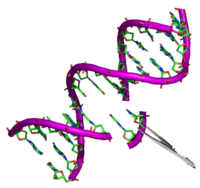
Photo from wikipedia
This review article discusses advanced extraction methods to enhance the functionality of egg-derived peptides while reducing their allergenicity. While eggs are considered a nutrient-dense food, some proteins can cause allergic… Click to show full abstract
This review article discusses advanced extraction methods to enhance the functionality of egg-derived peptides while reducing their allergenicity. While eggs are considered a nutrient-dense food, some proteins can cause allergic reactions in susceptible individuals. Therefore, various methods have been developed to reduce the allergenicity of egg-derived proteins, such as enzymatic hydrolysis, heat treatment, and glycosylation. In addition to reducing allergenicity, advanced extraction methods can enhance the functionality of egg-derived peptides. Techniques such as membrane separation, chromatography, and electrodialysis can isolate and purify specific egg-derived peptides with desired functional properties, improving their bioactivity. Further, enzymatic hydrolysis can also break down polypeptide sequences and produce bioactive peptides with various health benefits. While liquid chromatography is the most commonly used method to obtain individual proteins for developing novel food products, several challenges are associated with optimizing extraction conditions to maximize functionality and allergenicity reduction. The article also highlights the challenges and future perspectives, including optimizing extraction conditions to maximize functionality and allergenicity reduction. The review concludes by highlighting the potential for future research in this area to improve the safety and efficacy of egg-derived peptides more broadly.
Journal Title: Molecules
Year Published: 2023
Link to full text (if available)
Share on Social Media: Sign Up to like & get
recommendations!